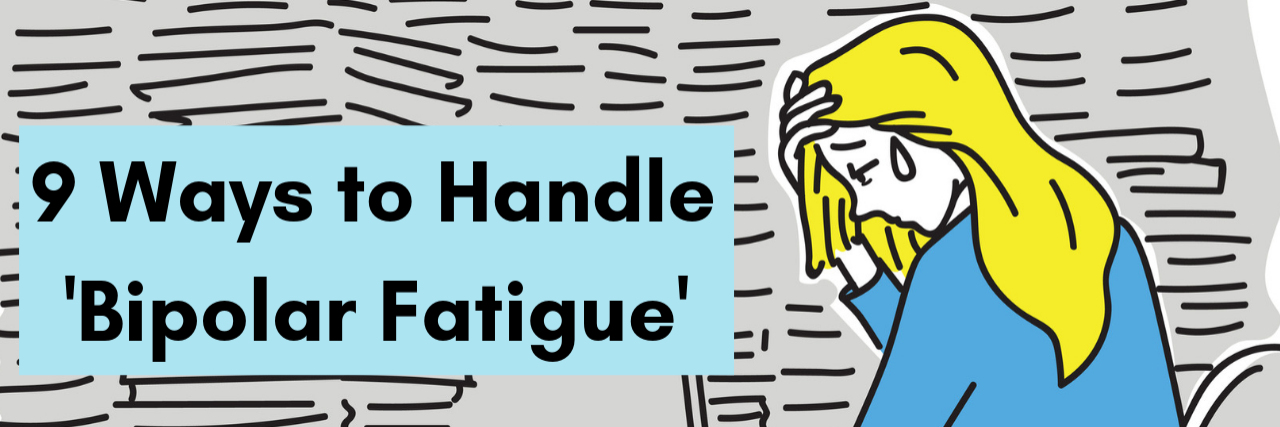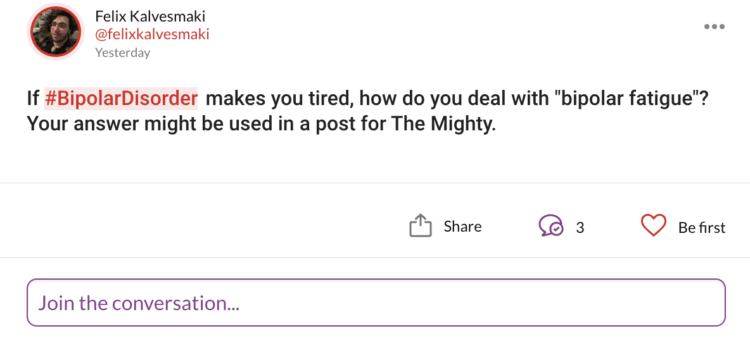Written by Felix Kalvesmaki.
Bipolar disorder can be exhausting. Swinging from invincible highs to rock-bottom lows, whether it’s through the course of a day or a month, can take its toll on someone’s well-being.
• What is Bipolar disorder?
Because of the intense ups and downs of living with bipolar disorder, those who have it may experience “bipolar fatigue.” Bipolar fatigue is the emotional and physical burnout that can come with daily life spent with mania and depression, and it’s hard to go through the motions of everyday life when you’re experiencing it.
What makes it worse, though, is that it can be invisible to those around you. Your friends, family, significant other or co-workers may not even realize you’re having a moment of bipolar fatigue. And that makes dealing with it much harder.
In spirit of this, we asked our bipolar community to tell us some of the ways they deal with bipolar fatigue.
Below you can read what they said.
Do you have a way of coping with bipolar fatigue? Let us know by clicking the image below and joining the conversation!
1. Accomplish what you can.
“I do a few household chores so I can feel a sense of accomplishment. Then I either watch some TV or play a video game until I can’t keep my eyes open.” — Sally C.
“I try to accomplish anything possible so I can reflect on my day and feel as though it isn’t a complete loss. If at the end of the day I have done nothing but sleep and binge watch crappy TV, I feel defeated, but I realize that is all I had and try to reset for tomorrow.” — Jaclyn M.
2. Sleep when your body asks you to.
“I sleep a lot. My medication makes me really tired so I often can be found taking cat naps during the day. I try to listen to my body and if it needs rest, it needs rest.” — Helen L.
“I get irritated really easily, so I isolate and try to sleep. It has to be dark and quiet. My ears constantly ring, my body aches and I can’t stand myself. I just want to sleep as much as possible!” — Lance N.
3. Caffeine, caffeine, caffeine.
“Lots of Dr. Pepper and an energy drink to start the day. I just gotta keep myself pumped up and rolling because once I stop, that’s it, I’m done.” — Sami P.F.
4. Plan to work when you’ll be the most productive…
“I try to maximize my time and to-do list for when I’ll have the most energy in the day, which is usually the evening.” — Denise L.
“I plan all my appointments/activities for the same day/morning. I try to get all ‘out of the house’ activities done on the same day. Since I’m already up and about for appointments, I will attempt grocery shopping and (some) cleaning as well. When I run out of energy, I then retreat back to the safety and comfort of my bed, where I can rest and recharge, knowing I’ve been somewhat productive.” — Nikki K.
Need a non-judgmental place to talk about bipolar disorder? Download our free app and connect with others using the hashtag #BipolarDisorder.
5. … Or decide to get stuff done, regardless of the time
“No matter what time night or day if I’m awake, I’ll get as much as I can done. When I’m going through a severe depressive cycle I am exhausted and my medication multiplies that symptom, so during those time periods I will use the time I’m wide awake in the early hours to do some housework so I feel I have met my daily goals while still being able to rest.” — Courtney F.
6. Try to get a workout in.
“I try to force myself to the gym. I go to Planet Fitness because I can promise myself a massage or tanning if I work out for 30 minutes.” — Heather A.
7. Read a book and escape for a bit.
“I try to immerse myself in either a good fantasy book or movie and it takes me away for that time and sort of refreshes me.” — Corrina-Leigh F.
8. Try to eat something healthy.
“For me, it’s all about nutrition. When I was at my worst, I ate [junk food] all day long: McDonalds, potato chips, ice cream and so on. Now I only eat veggies, fruits, berries and whole grains. I drink a lot of water and protein shakes. I’m not cured, but I’ve not been depressed or had mood swings in over three years.” — Gary P.
9. Slow down, and care for yourself.
“I always figure the fatigue means my body needs a little extra care. I’ll binge a crappy zombie show, cuddle with the kids and cats in bed, and take a nice hot bath. Sometimes I’ll go for a short walk, but if I’m too exhausted, I just stay right in bed.” — Shayla F.W.
“I give myself permission to rest without guilt or shame. I’m fighting a chronic illness. If I’m fatigued, I take care of myself by not pushing myself to do anything that will increase the fatigue.” — Kristy D.
Living with bipolar disorder requires a lot of balance. Regulating extreme episodes of emotion—those invincible highs or rock-bottom lows—all while navigating the pressures of human existence is a struggle. I would like to note, though, that while your symptoms may feel out of your control sometimes, the way you approach them is entirely up to you. Some of these little tricks, whether it’s working out to get an adrenaline rush or guzzling a pot of coffee, might be able to help you get through another day. And that’s all anyone can ask of you: that you wake up, try your best and go back to sleep to do it again tomorrow.
Can you relate? Download our free app to connect with other bipolar warriors.
Getty Images photo via jesadaphorn


